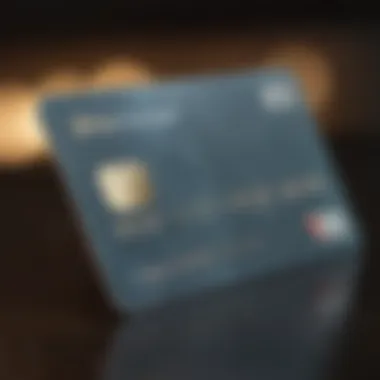Top Travel Debit Cards That Have No Fees


Intro
Traveling can be a delightful experience, but it often comes with the hefty price tag of international banking fees that can gnaw away at your budget. Many individuals overlook the potential benefits of travel debit cards that come with absolutely no fees. The ease of accessing local currency, the comfort of knowing your funds are secure, and avoiding pesky conversion costs are just a few incentives for choosing the right card.
In this segment, we will dive into the nitty-gritty of travel debit cards without fees. The discussion will skim over key features, benefits, and some downfalls you might want to mull over. We want to arm you with all the clever tips and the ins and outs of navigating this financial landscape so you can save more pennies for those fab experiences abroad.
By the end, you'll have a clearer picture of how these cards work, and how to make them work for you, ensuring your travel budget stretches as far as possible.
Investment Terminology
Understanding the terminology surrounding travel debit cards helps navigate their options and find the best fit for your needs.
Definition of Key Terms
- Travel Debit Card: A banking card that allows you to make withdrawals and purchases in foreign currencies without incurring hefty fees or unfavorable exchange rates.
- Foreign Transaction Fee: Sometimes, banks impose fees for transactions made in a currency other than the card's base currency. It’s crucial to look for cards that offer zero such fees.
- Exchange Rate Margin: The difference between the market exchange rate and the rate offered by your bank. Low or no margin is better for your pocket.
Explanation of Complex Concepts
When sifting through various options, it might get overwhelming. A few terms and concepts can seem cryptic, but they play a significant role in shaping your card usage.
- Dynamic Currency Conversion (DCC): This practice allows travelers to see prices in their home currency while abroad. Although it seems convenient, it often carries unfavorable conversion rates. Avoid this if possible!
- Chip-and-PIN vs. Magnetic Stripe: Chip-and-PIN cards tend to be more secure. In many countries, these are the norm, and having one can smooth out payment hiccups during travel.
"Choosing the right travel debit card can significantly enhance your financial experience abroad, ensuring more value for your money."
Familiarizing yourself with these terms will put you a step ahead in making well-rounded decisions that align with your travel plans.
Expert Advice
Getting insights from those who have traversed this landscape can be invaluable. Here’s some key advice gathered from financial aficionados who have weathered the storm of foreign travel.
Best Practices for Investment
- Assess Your Travel Patterns: Know when and where you'll be traveling. Some cards might shine in certain regions but flop in others.
- Monitor Exchange Rates: Keep an eye on market trends for currency conversions before heading out—it can save you a bundle!
Tips from Financial Experts
- Read the Fine Print: Always skim through the details of what each card offers. It’s crucial to know any hidden fees or account requirements.
- Consider ATM Accessibility: Check the availability of ATMs that won’t charge you additionally when you withdraw cash.
- Embrace Multiple Cards: Sometimes having two or three options can provide backup and flexibility. Just keep track of which one offers the best deals and incentives.
By internalizing these expert recommendations, you can navigate the world of travel debit cards more effectively, ultimately leading to smarter financial choices abroad.
Preamble to Travel Debit Cards
When packing your bags for a trip, not many think as much about their payment options as they do about their essential travel gear. However, the choice of how to manage your money abroad can be as important as that trusty pair of shoes or favorite jacket. Travel debit cards have gained traction for good reason, often providing financial safety without the extra fees typical of traditional banking methods. Exploring their intricacies can save travelers a pretty penny, making it an essential part of any travel plan.
Defining Travel Debit Cards
Travel debit cards are specifically designed for international use, allowing users to withdraw cash or make purchases without incurring hefty fees. In essence, these cards enable access to your funds while you’re globe-trotting, all while minimizing risks typically associated with credit cards, such as potential debt accumulation. They draw directly from your bank account, so there’s less temptation to overspend, which can be a common pitfall for those handling unfamiliar currencies.
Benefits of Using a Debit Card While Traveling
Choosing a travel debit card comes with several advantages. One of the primary perks is the ability to avoid foreign transaction fees, which can sneak up on travelers like a thief in the night. Many debit cards also offer competitive exchange rates and allow for effortless ATM withdrawals—an excellent way to have local currency on hand without the hassle of finding a currency exchange. Here’s a quick rundown of the benefits:
- No foreign transaction fees: Keep more of your money where it belongs—in your pocket.
- Easy access to funds: Withdraw cash from ATMs worldwide using local currency.
- Control over spending: Since it’s linked directly to your account, it helps in budgeting while traveling.
- Secured transactions: Many travel debit cards offer fraud protection that can give peace of mind.
"Having a travel debit card is like having a safety net; it provides flexibility without the risks associated with credit."
Understanding Fees Associated with Travel Cards
Despite the allure of travel debit cards, it’s crucial to understand that some may have fees that can catch you off guard. Not all cards are created equal, and a deeper dive into fee structures is a must. For example, some may charge for ATM withdrawals or impose limits on the amount of cash you can take out at once. Others might have a conversion markup, so the exchange rate isn’t as favorable as advertised. Ultimately, being well-informed about these costs can prevent unwelcome surprises during your travels.
In short, understanding travel debit cards and their fees is invaluable. It can help you keep your finances in check while navigating both known and unknown territories.


Criteria for Selecting the Best Travel Debit Card
When hunting for the right travel debit card, understanding the various criteria is crucial. It’s not just about finding a card that doesn’t charge fees, but digging deeper into what each card offers can make a world of difference during your travels. The criteria help ensure that you make a wise choice, keeping your budget intact while maximizing convenience and security.
Interest Rates and Currency Conversion
One might not think about interest rates immediately, especially with debit cards, but looking carefully at this aspect is a must. While debit cards themselves may not carry high-interest rates like credit cards, some still can add fees for currency conversions when you're abroad. Paying attention to how your bank approaches the conversion on foreign transactions is key to getting fair value for your money. For instance, some banks might tag on a conversion fee even if they don’t charge for ATM withdrawals. To avoid getting burned, check whether the bank uses the interbank rate or if they apply a markup on it. It’s like finding a needle in a haystack but totally worth it for your wallet.
ATM Access and Withdrawal Fees
When travelling, cash can often be king, and having reliable access to ATMs is paramount. Here, examining the ATM network your card belongs to is essential. A card that offers free access to broad networks can save you not just dollars but also precious time that could be spent exploring. Look into whether your card issuer forms partnerships with local banks to minimize withdrawal fees. Even if the card boasts no foreign transaction fees, the bank may still charge for using an ATM outside of its network. Familiarizing yourself with these details can prevent unnecessary expenses, placing you one step ahead.
Foreign Transaction Fees
Foreign transaction fees are another slippery slope for travelers. While some debit cards boast “no fees,” they may still sneak in hidden charges that can get under your skin. Therefore, it’s wise to read the fine print thoroughly. These fees can range considerably and may apply not just to purchases but also to any cash withdrawals done overseas. A good rule of thumb is to target cards explicitly advertised as fee-free when used abroad. Don’t leave your travel budget vulnerable to extra charges just because you skimmed through the terms.
Fraud Protection and Security Features
Safety should never be an afterthought when choosing a debit card for travel. Cards with robust fraud protection measures, like real-time transaction alerts or zero liability policies, can provide substantial peace of mind. If something doesn't smell right, you want assurance that you won't be left holding the bag. It's a good idea to favor cards that offer chip technology or dynamic card numbers for online purchases, as these features can protect you from skimming and other fraudulent activities. Not every card offers the same level of security, so this criterion should be high on your list.
"A smart traveler always prioritizes safety while finding the best value."
In wrapping this up, the criteria for selecting a travel debit card revolve around understanding key aspects like interest rates, ATM access, foreign transaction fees, and fraud protection. By taking these elements into account, you’ll be in a stronger position to select a card that serves you well on your adventures.
Top Travel Debit Cards With No Fees
When planning travels, the financial tools at your disposal can significantly influence your experience. Travel debit cards that come without fees represent a vital resource for managing money while exploring the world. Unlike typical debit cards that impose various charges, these cards help keep your hard-earned cash intact. They make financial sense for travelers wanting to avoid unneeded expenses, which can pile up quickly when abroad.
Such cards can empower users to make purchases or withdrawals like a native. Beyond that, they cater to those conscious about their budgets while enjoying the perks of modern banking. However, not all travel debit cards are the same, and some can still sneak in hidden fees under the radar, which is what this section aims to clarify.
Discovering the intricacies of fees and benefits makes a world of difference. It's essential to understand how different offers stack up against each other based on various elements. In this exploration, we will look into three notable travel debit cards—Card A, Card B, and Card C—considering their unique features and attributes closely.
Card A Overview and Features
Benefits of Card A
Card A shines thanks to its unparalleled convenience for globe-trotters. This card offers zero foreign transaction fees, ensuring each dollar you spend counts. The real kicker is its ATM access. Card A users can withdraw cash from a large network of ATMs without incurring additional charges.
Key Feature: Real-time fraud alerts keep users informed, preventing any unwanted surprises. This contributes significantly to peace of mind while navigating unfamiliar environments. It’s easy to see why many travelers consider it their go-to option.
Beyond just convenience, Card A’s exchange rates tend to be favorable, which is another shining aspect. These rate advantages can manage to stretch travel budgets, allowing for those extra adventures or souvenirs that wouldn’t have been possible otherwise.
Limitations of Card A
Despite its strengths, Card A isn’t without some drawbacks. One notable limitation lies in its monthly maintenance fee. While it may appear insignificant on paper, every cent adds up, particularly if you're on a tight budget.
Key Characteristic: The lack of physical branches means any cash deposits must often be performed through a third-party network, which can come with its own headaches. This could potentially lead to higher waiting times and fees that travelers might not anticipate, somewhat tainting the overall value proposition.
Card B Overview and Features
Benefits of Card B
Shifting gears, Card B takes a different approach. Right off the bat, it stands out with no minimum balance requirement. This makes it great for students or those who might not have steady cash flow while traveling. Additionally, this card offers a sleek mobile app that customers rave about for managing finances on the go.
Unique Feature: Instant fund transfers between users can be a game changer. If you're on a trip with friends and need to split expenses, it’s as straightforward as sending a text. This adds a social dimension to finances that many have found enhances their travel experience significantly.
Limitations of Card B
Still, it has its share of downsides, namely the somewhat restrictive ATM network. While some might not mind, travelers venturing into remote locations could face difficulties finding participating ATMs.
The lack of a competitive exchange rate is also a common complaint. When spending on the card, users might find that they often get less bang for their buck, which is something to ponder, especially for long trips or multiple transactions.
Card Overview and Features


Benefits of Card
Lastly, we have Card C, which caters to tech-savvy travelers. Its standout feature is the dynamic currency conversion. This allows users to see transaction amounts in their home currency at the point of sale, bringing more transparency into the spending process.
Key Characteristic: User-friendly interfaces and high-level customer support make card C a practical choice for those who value smooth operations while abroad. Additionally, this card offers travel insurance, which can alleviate stress when dealing with unforeseen mishaps on the road.
Limitations of Card
Nevertheless, Card C comes with its own set of hurdles. Users often notice small hidden charges that appear during transactions. Therefore, squinting at fine print is necessary. That said, some deem this a fair trade-off for the ancillary benefits it provides.
Moreover, while the insurance tempers risks, it just may not cover everything, leading to potential out-of-pocket expenditures in emergencies.
Always read the specifics before you choose a card, as terms and conditions can vary greatly with each.
While each card offers unique advantages and challenges, understanding what fits best for an individual's travel style is crucial. Ultimately, being intricately aware of these cards can go a long way in saving money while traveling.
Comparative Analysis of Offered Services
In understanding the landscape of travel debit cards, a comparative analysis of offered services becomes paramount. This evaluation not only sheds light on the variations across different cards but also assists travelers in making educated choices that align with their needs and spending habits. When planning a trip, individuals seek not just convenience but also financial efficiency. Therefore, a thoughtful examination of what each card delivers can significantly influence both wallet and wanderlust.
Fee Structures Across Different Cards
Among the numerous aspects to inspect, fee structures often sit front and center. Not all travel debit cards are created equal in this regard. Some cards may promote themselves as fee-less but might impose hidden charges in the fine print. It's crucial to delve into specifics such as:
- Monthly maintenance fees: Some cards come with a monthly upkeep cost that can chip away at your available funds, making them less appealing.
- ATM withdrawal fees: While one card might allow free use at ATMs, another could charge for every transaction, adding up over time.
- Foreign exchange fees: Even some cards that tout zero foreign transaction fees can still hit you with sneaky currency conversion costs.
Paying attention to these elements ensures that you choose a card that truly supports your travel ambitions without stacking unnecessary fees.
Rewards and Cashback Programs
Many travelers are now looking to maximize their spending capabilities through rewards and cashback programs. Some debit cards offer enticing perks that can actually benefit a traveler when spending abroad. Consider the following:
- Points per transaction: Certain cards reward you with points for every dollar spent, which can later be redeemed for travel discounts or even cashback.
- Partner rewards: Some banks collaborate with airlines or hotel chains, allowing travelers to accrue points based on their travel activities.
- Annual bonuses: Getting a reward for reaching a spending threshold can be an extra cherry on top that goes a long way, especially when travel expenses start piling up.
However, it’s important to read the fine print. Programs may have expiration dates on points or require a minimum spend to qualify, which can lead to missed opportunities.
Travel Insurance and Other Benefits
Selecting a travel debit card should also incorporate considerations about additional benefits, especially travel insurance. Some cards offer:
- Trip cancellation insurance: This might just save your pockets if unexpected changes arise in plans.
- Lost luggage protection: If you travel frequently, the comfort of knowing your possessions are covered can alleviate stress.
- Emergency medical assistance: Access to medical help or assistance while travelling is an invaluable asset for any trip.
These added benefits don't always carry a higher fee; instead, they can enhance your travel experience significantly. Thus, understanding the full breadth of services provided goes a long way in making a solid choice that serves you well in many aspects of your journey.
"Taking the time to analyze various services offered by travel debit cards is not merely about finding the best option; it’s about finding the one that best fits your travel style and financial priorities."
By taking these multiple facets into account, you're not just choosing a card; you’re setting the stage for memorable experiences that can be both enjoyable and economical.
Practical Considerations in Using Debit Cards Abroad
Using debit cards while traveling can be a mixed bag, and it’s essential to consider practical aspects that can influence your experience. Beyond mere convenience, these cards can significantly impact your financial journey abroad. Understanding how to mindfully handle your expenses can save you from unwanted surprises at the end of your trip. Also, familiarity with local banking systems helps you navigate better and manage your funds efficiently.
Managing Funds and Budgeting
Let’s dive into the nitty-gritty of managing funds. When you’re in a foreign country, being frugal is crucial, and debit cards can be a double-edged sword. On one hand, they take away the stress of carrying cash; on the other, they require wise budgeting. It’s important to set a realistic budget before you start your adventures.
- Keep Track of Your Spending: Use the mobile banking app to monitor your transactions. This helps you stick to your plan. If you’re overshooting your budget on day two, you have time to recalibrate.
- Keep Some Cash on Hand: Some places might not accept cards, especially in rural areas. Always have some local currency for those times when technology fails.
- Set Up Alerts: Many debit card providers allow you to set up transaction alerts. This can help you keep an eye on unexpected charges.
In essence, combining digital tools with old-school budget management techniques will carve a smoother path while you’re globe-trotting.
Understanding Local Banking Systems
Knowing how local banking systems operate can really put you ahead of the game. It’s like learning the lay of the land before diving in. Different countries have varying attitudes toward banking and monetary transactions, and getting a grasp on this can save you time and money.


- Research Local ATM Networks: Not all ATMs are created equal. Some may charge hefty fees, while others might be connected to your bank's network, allowing fee-free withdrawals. Researching this before your trip can lead to savings when withdrawing cash, especially when you are in a pinch.
- Check Currency Exchange Rates: Awareness of currency fluctuations will help you determine when it’s best to withdraw money or make purchases. Familiarizing yourself with local currency even slightly can mean considerable savings.
- Understand Payment Systems: Some countries prefer certain payment methods over others—know if credit cards, debit cards, or cash reign supreme. This small understanding could lead to fewer hassles when paying for meals or shopping.
Navigating these practical considerations adds layers to your travel experience while helping you manage your finances smartly. Staying alert and informed can safeguard you from financial pitfalls, thereby ensuring that the adventure remains the focus rather than the financial woes.
What to Do in Case of Card Issues
When traveling abroad, having ready access to your funds is crucial. However, issues with your debit card can arise unexpectedly, causing stress and anxiety. Knowing what to do in such situations not only helps mitigate the inconvenience but also reassures you that you're prepared for any unexpected problems. This section discusses essential steps to take if your travel debit card is lost, stolen, or compromised, ensuring your travels are as smooth as possible.
Reporting Lost or Stolen Cards
Losing your debit card or realizing it has been stolen is like finding out your favorite pair of shoes just vanished into thin air. It can throw anybody for a loop. However, it’s essential to act fast. Here’s what you should do:
- Contact Your Bank Immediately: The moment you realize your card is missing, reach out to your bank's customer service. Most banks have a 24/7 helpline specifically for lost or stolen cards. This allows you to block the card promptly, preventing unauthorized use.
- Verify Transactions: Once you’ve reported your card, ask your bank to investigate any recent transactions. They might be able to provide insights into unauthorized charges, which could be crucial if you need to dispute any charges later.
- Request a Replacement: After the dust has settled, request a replacement card. Some banks can expedite this process, especially if you're traveling. Be sure to confirm how long the new card will take to arrive and whether they'll send it to your current location.
"Timely responses are vital—don't hesitate to make that call!"
Remember to keep a copy of your bank’s contact information. Having it handy can save precious moments when you're in distress.
Disputing Unauthorized Transactions
Finding unfamiliar charges on your bank statements is akin to discovering a dead rat in your attic: it’s alarming and unwanted! If you notice a transaction that doesn’t belong to you, follow these steps to dispute it:
- Document Everything: Keep records of any unauthorized charges. This includes dates, amounts, and descriptions of transactions. If possible, take screenshots for a visual trail. This evidence will support your case when contacting the bank.
- Reach Out to Your Bank: Similar to reporting a stolen card, contact your bank. Most banks have specific protocols for disputes. Explain the situation, providing in-depth details to help them better understand your case.
- Follow Up Regularly: After filing a dispute, ensure you're not left in the dark. Follow up with your bank to check the status of your dispute, and ask what information they may still need from you. This keeps you engaged in the resolution process.
- Stay Vigilant: Monitor your account closely for any new unauthorized charges. If anything seems off, report it immediately.
Disputing unauthorized transactions can be a hassle, but it's fundamentally necessary to protect your finances and ensure you're not held liable for someone else's shady deals. Knowing how to navigate these situations can transform a potentially dreadful experience into a manageable one.
Future Trends in Travel Debit Cards
As travel continues to evolve in our digital age, the landscape surrounding travel debit cards is also shifting. These cards are changing steadily with the times, adapting to emerging technologies and consumer preferences. The focus on future trends is crucial, as it helps consumers anticipate what to expect when choosing a travel debit card. Knowing the latest advancements and evolving expectations in this sector allows travelers to equip themselves better for their journeys.
Technology Advancements in Financial Tools
In recent years, technology has made a significant impact on the functionality and convenience of travel debit cards. For instance, we now have contactless payments which are becoming the norm. Imagine the ease of tapping your card at a point of sale rather than fumbling with cash or entering a PIN. This speeds up transactions, allowing for a smoother experience when you’re on the go.
Moreover, mobile wallets are gaining popularity. Cards can be linked to apps like Apple Pay or Google Pay, enabling a seamless digital currency exchange. Not only does this add layers of convenience, but it also provides additional security, since you don’t have to keep your physical card always on hand.
Biometric verification methods such as fingerprint scans are also being integrated into debit cards. This means users can access their financial tools without needing to remember a lengthy PIN or worry about unauthorized transactions. As more people travel internationally, security features are paramount.
Evolving Consumer Expectations
The current customer base for travel debit cards isn't the same as it was a few years ago. Today’s travelers demand more than just basic banking services. They seek transparency, flexibility, and comprehensive customer support. Many expect a user-friendly interface in banking apps that allow them to manage their finances on the go.
In addition, consumers are increasingly aware of the fees associated with international spending. They are looking for no foreign transaction fees and minimal withdrawal charges. This trend reveals a shift towards a willingness to switch cards if current options do not align with these expectations.
"The best value isn’t just about zero fees anymore; it’s about the entire package – features, customer support, and flexible options."
Furthermore, environmentally conscious customers are showing a preference for companies that prioritize sustainability in their operations. This includes debit cards made from recycled materials or companies that invest in carbon offset programs. Understanding these evolving expectations helps card issuers tailor their products better to meet the ever-changing market demands.
In summary, future trends in travel debit cards are driven by technology advancements and shifting consumer preferences. As businesses adapt to these new realities, travelers can expect more innovative, secure, and user-friendly services, ultimately enhancing their travel experiences.
Finale
When it comes to navigating the often complex world of travel debit cards, understanding their nuances is absolutely crucial. This part of the discussion pulls together all the threads we've explored, weaving a comprehensive view of how a travel debit card can either bolster or hinder your financial experience while abroad.
Making Informed Decisions
In the landscape of travel debit cards, making informed decisions is key. Not all cards are created equal, and what works for one person may not suit another. Factors such as fees, services offered, and specific benefits should be closely examined. It's like shopping for the right tool in a toolbox. You wouldn’t grab the first thing you see, but rather assess which one fits your needs best.
- Look for features that align with your travel habits.
- Be aware of specific terms and conditions that could impact your ease of use.
- When in doubt, consult user reviews to gain insights from others’ experiences.
By taking the time to investigate and compare options, you empower yourself to make choices that not only enhance your travel experience but also keep your finances in check.
Summary of Recommendations
To wrap things up, here’s a brief recap of what we've come to learn:
- Prioritize No-Fee Options: Choose debit cards that don’t impose foreign transaction fees or ATM withdrawal fees, as these can eat into your travel budget fast.
- Check for Added Benefits: Look at perks beyond just fee structures—some cards offer travel insurance or customer support that can be a lifesaver in foreign lands.
- Stay Informed on Security Measures: Opt for cards that offer robust fraud protection features to secure your hard-earned money.
"A penny saved is a penny earned," so choose wisely.







